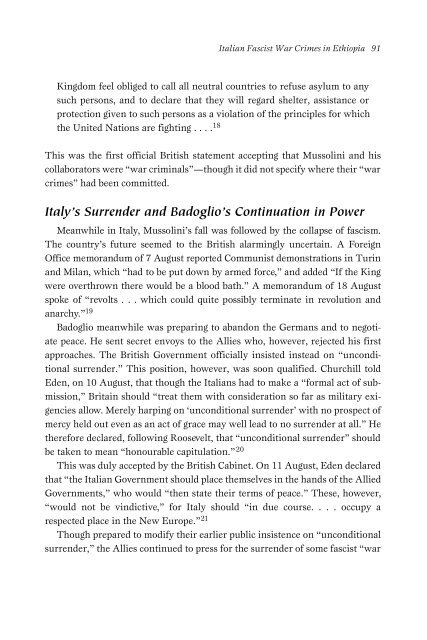Italian Fascist War Crimes in Ethiopia - Societa italiana di storia ...
Italian Fascist War Crimes in Ethiopia - Societa italiana di storia ...
Italian Fascist War Crimes in Ethiopia - Societa italiana di storia ...
Create successful ePaper yourself
Turn your PDF publications into a flip-book with our unique Google optimized e-Paper software.
<strong>Italian</strong> <strong>Fascist</strong> <strong>War</strong> <strong>Crimes</strong> <strong>in</strong> <strong>Ethiopia</strong> 91<br />
K<strong>in</strong>gdom feel obliged to call all neutral countries to refuse asylum to any<br />
such persons, and to declare that they will regard shelter, assistance or<br />
protection given to such persons as a violation of the pr<strong>in</strong>ciples for which<br />
the United Nations are fight<strong>in</strong>g . . . . 18<br />
This was the first official British statement accept<strong>in</strong>g that Mussol<strong>in</strong>i and his<br />
collaborators were “war crim<strong>in</strong>als”—though it <strong>di</strong>d not specify where their “war<br />
crimes” had been committed.<br />
Italy’s Surrender and Badoglio’s Cont<strong>in</strong>uation <strong>in</strong> Power<br />
M e a nwhile <strong>in</strong> Italy, Mussol<strong>in</strong>i’s fall was followed by the collapse of fascism.<br />
The country’s future seemed to the British alarm<strong>in</strong>gly uncerta<strong>in</strong>. A Fo re i g n<br />
Office memorandum of 7 August reported Communist demonstrations <strong>in</strong> Tur<strong>in</strong><br />
and Milan, which “had to be put down by armed forc e,” and added “If the K<strong>in</strong>g<br />
we re ove r t h rown there would be a blood bath.” A memorandum of 18 Au g u s t<br />
s p o ke of “revolts . . . which could quite possibly term<strong>in</strong>ate <strong>in</strong> revolution and<br />
a n a rc hy. ” 1 9<br />
Badoglio meanwhile was prepar<strong>in</strong>g to abandon the Germans and to negotiate<br />
peace. He sent secret envoys to the Allies who, however, rejected his first<br />
approaches. The British Government officially <strong>in</strong>sisted <strong>in</strong>stead on “uncon<strong>di</strong>tional<br />
surrender.” This position, however, was soon qualified. Churchill told<br />
Eden, on 10 August, that though the <strong>Italian</strong>s had to make a “formal act of submission,”<br />
Brita<strong>in</strong> should “treat them with consideration so far as military exigencies<br />
allow. Merely harp<strong>in</strong>g on ‘uncon<strong>di</strong>tional surrender’ with no prospect of<br />
mercy held out even as an act of grace may well lead to no surrender at all.” He<br />
therefore declared, follow<strong>in</strong>g Roosevelt, that “uncon<strong>di</strong>tional surrender” should<br />
be taken to mean “honourable capitulation.” 20<br />
This was duly accepted by the British Cab<strong>in</strong>et. On 11 August, Eden declared<br />
that “the <strong>Italian</strong> Government should place themselves <strong>in</strong> the hands of the Allied<br />
Governments,” who would “then state their terms of peace.” These, however,<br />
“would not be v<strong>in</strong><strong>di</strong>ctive,” for Italy should “<strong>in</strong> due course. . . . occupy a<br />
respected place <strong>in</strong> the New Europe.” 21<br />
Though prepared to mo<strong>di</strong>fy their earlier public <strong>in</strong>sistence on “uncon<strong>di</strong>tional<br />
surrender,” the Allies cont<strong>in</strong>ued to press for the surrender of some fascist “war

















